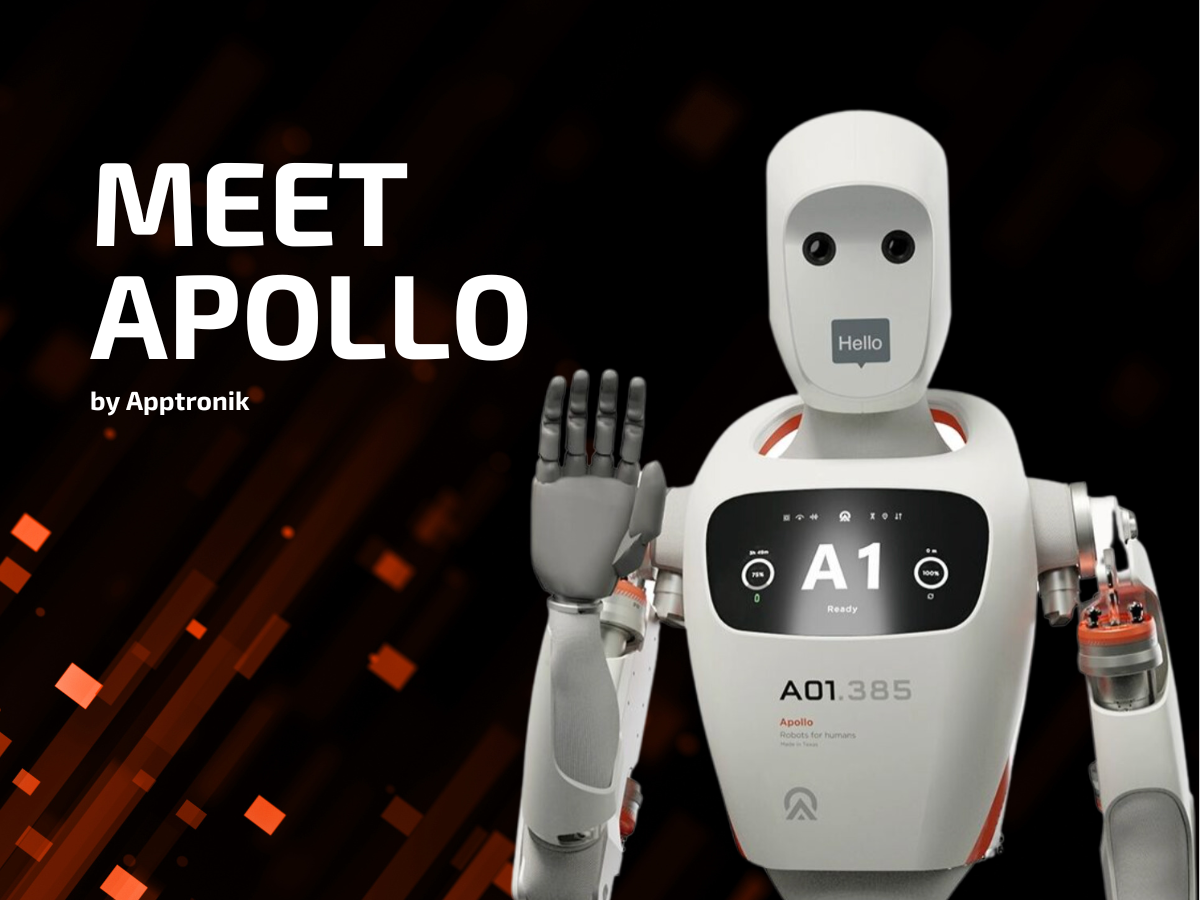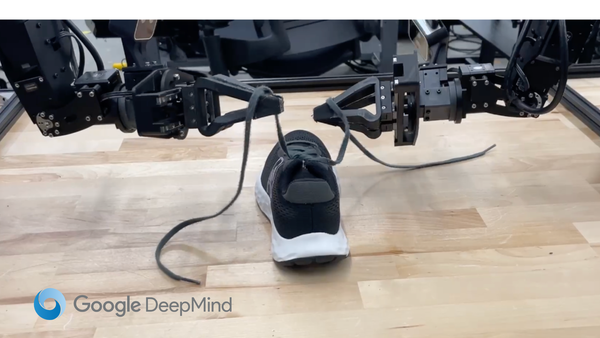Apollo Humanoid Robot from Apptronik
Learn about Apollo from Apptronik. A versatile humanoid robot for warehouses, plants, and more.

Apollo Is A Versatile General Purpose Humanoid Robot
Apollo is a general-purpose humanoid robot capable of performing millions of tasks. Initially, Apollo will operate in warehouses and manufacturing plants, with plans to extend its capabilities to construction, oil and gas, electronics production, retail, home delivery, elder care, and countless other areas.
Apollo offers flexibility and efficiency and is designed to handle tasks in distribution centers and manufacturing plants.
Task switching is as simple as a point and click, making Apollo an invaluable asset in automating processes and addressing labor shortages.
Apollo Specifications
Apollo Is Built For A Human-Centric World
Apollo is 5’8” tall, making it suitable for tasks requiring a human-like presence and reach. It weighs 160 lbs, providing a stable and robust build that allows it to handle various tasks without compromising balance or mobility.
Apollo is equipped with a battery pack that offers a runtime of 4 hours. With hot-swappable batteries, it ensures continuous operation without significant downtime.
Additionally, Apollo has a payload capacity of 55 lbs, enabling it to lift and transport heavy items, making it an invaluable asset in manufacturing and logistics environments.

Apollo Value Proposition
Apollo Addresses Significant Market Challenges Through Innovation And Automation
Tackle Labor Shortages
The labor market is facing ongoing challenges, with shortages expected to worsen. Apollo can fill these gaps, allowing human workers to transition into higher-skilled roles. This flexibility ensures that essential tasks are covered while enabling the workforce to focus on more complex and rewarding positions.
Reduce Turnover
By assigning Apollo to tasks that are typically undesirable for employees, job satisfaction can be significantly improved. When workers are relieved from monotonous or strenuous duties, retention rates increase as their overall job experience becomes more positive and fulfilling.
Improve Efficiency
Apollo operates on a Robotics-as-a-Service (RaaS) model, delivering a return on investment. This model helps reduce the overall labor cost by providing a cost-effective solution that enhances productivity without requiring substantial upfront investment.
Reduce Work-Related Injuries
Workplace injuries are a significant concern, with overexertion accounting for one-third of all incidents. Apollo can mitigate these risks by taking on heavy lifting and physically demanding tasks, decreasing the likelihood of injuries, and creating a safer work environment for employees.
Apollo Features
Apollo Features Modular Design, Intuitive Interaction, And Long Battery Life

Modular Design
Apollo boasts a modular design that allows it to be mounted on any mobility platform, whether stationary or fully mobile, with legs. This flexibility ensures that Apollo can be adapted to various environments and applications, making it a versatile tool for numerous tasks.
Intuitive Interaction
Apollo has LEDs in its head, mouth, and chest, communicating its status. This intuitive interaction system helps operators understand Apollo's current state easily, enhancing usability and integration into human-centric workflows.
Battery Life
Apollo features hot-swappable battery packs that provide a four-hour runtime. This capability allows Apollo to continue working with a simple battery change, avoiding downtime associated with plug-in charging. For continuous operation, Apollo can also be plugged in to charge or tethered as needed, ensuring it remains operational for extended periods.
Apollo Software
Apollo Software Simplifies Control And Enhances Capabilities With Ai Learning
Point-and-Click Control
Apollo’s software suite provides a user-friendly interface that enables point-and-click control of humanoid robots. This intuitive system allows for the easy deployment and full integration of various automation solutions within warehouse and manufacturing operations. The control system's simplicity ensures that users can quickly and efficiently manage robotic tasks without extensive training or technical expertise.
Collaboration with NVIDIA’s Project GR00T
Apollo is collaborating with NVIDIA’s Project GR00T to enhance its capabilities by learning new tasks from human demonstrations. This partnership allows Apollo to develop versatile applications through generalized skills like coordination and dexterity. By observing and replicating human actions, Apollo can adapt to tasks, making it an even more valuable asset in diverse operational settings.
Apollo Safety
Apollo Ensures Safety With Advanced Force Control And Responsive Zones
Advanced Force Control Architecture
Apollo is designed with a unique force control architecture that ensures safe movement around humans, similar to the safety advantages of collaborative robots over industrial robots. This advanced system allows Apollo to interact seamlessly and safely with human workers, minimizing the risk of accidents or injuries.
Perimeter Zone
Apollo has a perimeter zone feature that enhances its safety in dynamic environments. Apollo's behavior can be adjusted to maintain a safe working environment when an object is detected within this outer zone. This proactive adjustment helps prevent potential collisions and ensures smooth operation around human operators.
Impact Zone
For additional safety, Apollo includes an impact zone that triggers an immediate pause in movement when moving objects are detected within its radius. This quick response mechanism is crucial for preventing accidents and maintaining a secure workspace, ensuring that Apollo can operate effectively without compromising the safety of those around it.
Apollo Use Cases
Apollo Addresses Labor Shortages And Enhances Efficiency Across Multiple Use Cases

Trailer Unloading
- Challenges: Unloading trailers is particularly difficult, especially in extreme weather conditions, and becomes even more challenging with heavy cases.
- Value Proposition: Automation in trailer unloading is a growing trend that addresses labor shortages by redeploying human workers to more suitable tasks.
- Solution: Apollo can manage various tasks in a distribution center and switch tasks throughout the day. Unlike specialized solutions, Apollo performs multiple functions, enhancing overall efficiency.
Case Picking
- Industry Challenge: Case picking involves extensive walking, heavy lifting, and pulling, which leads to labor shortages, high turnover, and space issues.
- Value Proposition: Autonomous Mobile Robots (AMRs) can reduce walking and pulling but don't fully eliminate manual labor.
- Solution: Apollo works with AMRs to fully automate the case picking process, eliminating the need for humans to walk long distances, lift heavy cases, and use pallet equipment. Apollo performs millions of tasks, especially those that are undesirable to humans.
Palletization
- Industry Challenge: Palletization and depalletization require significant labor and/or specialized equipment. Using specialized equipment for downstacking from floor-loaded trailers can be impractical and unsafe.
- Value Proposition: Automating palletization and downstacking addresses labor shortages.
- Solution: Apollo offers flexible automation in distribution centers, switching between daily tasks and providing a versatile solution. Apollo is often more practical than specialized equipment in many scenarios.
Machine Tending
- Industry Challenge: Employees must transfer totes from workcells or lines to tugger carts.
- Value Proposition: Autonomous tuggers reduce the need for tugger drivers but don't fully automate the process.
- Solution: Apollo works with autonomous tuggers to fully automate the tote-based machine tending process, eliminating the need for humans to transfer totes. This allows for the upskilling of employees to more advanced positions, enhancing overall efficiency and productivity in manufacturing plants.
Workcell Delivery
- Industry Challenge: Transferring totes from tugger carts to workcells is inefficient and still requires labor, leading to interruptions or the need for additional low-skilled labor.
- Value Proposition: Autonomous tuggers reduce some labor needs but still require human intervention.
- Solution: Apollo automates the delivery process, working with autonomous tuggers to eliminate the need for manual transfer of totes. This allows operators to work without interruption and avoids the need to upskill low-skilled labor. Apollo increases overall plant productivity by handling and switching tasks throughout the day.
Apollo Collaborations and Deployments
Apptronik Collaborates With Leading Companies To Improve Apollo
Apptronik and Mercedes-Benz
- Announced collaboration on March 15, 2024.
- Aim: Integrate Apollo into Mercedes-Benz’s logistics and assembly processes.
- Goal: Automate repetitive and physically demanding tasks to enhance efficiency and support workers.
- Tasks: Deliver assembly kits and inspect components.
- Objective: Improve production without extensive facility redesigns.
Apptronik and NVIDIA
- Announced collaboration on March 18, 2024.
- Integration: Use NVIDIA’s Project GR00T to enhance Apollo's learning capabilities.
- Benefit: Apollo can learn complex tasks from human demonstrations, expanding its functionality.
- Goal: Advance general-purpose humanoid robots to serve humanity with intelligent and adaptive behavior.
Apptronik and GXO
- Announced partnership on June 20, 2024.
- Program: Early-stage proof-of-concept to integrate Apollo into warehouse environments.
- Goal: Reduce repetitive work and improve safety in labor-intensive processes.
- Objective: Fine-tune Apptronik's AI model for deployment in a U.S. distribution center to enhance GXO's logistics operations and create a safer workplace.
- Significance: Represents a significant step in advancing humanoid innovation in the logistics industry.
Source: Apptronik Website



